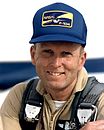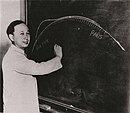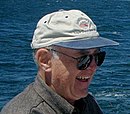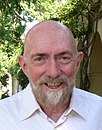California Institute of Technology
The California Institute of Technology (branded as Caltech)[a] is a private research university in Pasadena, California. The university is responsible for many modern scientific advancements and is among a small group of institutes of technology in the United States that are strongly devoted to the instruction of pure and applied sciences.[10][11] Due to its history of technological innovation, Caltech has been considered to be one of the world's most prestigious universities.[b]
Former names
- Throop University (1891–1907)
- Throop Polytechnic Institute and Manual Training School (1907–1913)
- Throop College of Technology (1913–1920)[1]
September 23, 1891
$3.5 billion (2022)[3]
300 professorial faculty[4]
2,397 (2021–22)
987 (2021–22)[5]
1,410 (2021–22)[5]
Midsize city[6], 124 acres (0.50 km2)
The California Tech
Orange and white[7]
Beavers
Bernoulli the Beaver[8]
The institution was founded as a preparatory and vocational school by Amos G. Throop in 1891 and began attracting influential scientists such as George Ellery Hale, Arthur Amos Noyes, and Robert Andrews Millikan in the early 20th century. The vocational and preparatory schools were disbanded and spun off in 1910, and the college assumed its present name in 1920. In 1934, Caltech was elected to the Association of American Universities, and the antecedents of NASA's Jet Propulsion Laboratory, which Caltech continues to manage and operate, were established between 1936 and 1943 under Theodore von Kármán.[12][13]
Caltech has six academic divisions with strong emphasis on science and engineering, managing $332 million in sponsored research in 2011.[14] Its 124-acre (50 ha) primary campus is located approximately 11 mi (18 km) northeast of downtown Los Angeles, in Pasadena. First-year students are required to live on campus, and 95% of undergraduates remain in the on-campus housing system at Caltech. Student life is governed by an honor code that allows faculty to assign take-home examinations. The Caltech Beavers compete in 13 intercollegiate sports in the NCAA Division III's Southern California Intercollegiate Athletic Conference (SCIAC).
Scientists and engineers at or from the university have played an essential role in many modern scientific breakthroughs and innovations, including advances in sustainability science, quantum physics, earthquake monitoring, protein engineering, and soft robotics.[15][11][16] As of October 2022, there are 79 Nobel laureates who have been affiliated with Caltech, making it the institution with the highest number of Nobelists per capita in America.[17][18] This includes 46 alumni and faculty members (47 prizes, with chemist Linus Pauling being the only individual in history to win two unshared prizes). In addition, four Fields Medalists and six Turing Award winners have been affiliated with Caltech.[19]
Caltech startups[edit]
Over the years Caltech has actively promoted the commercialization of technologies developed within its walls. Through its Office of Technology Transfer & Corporate Partnerships,[186] scientific breakthroughs have led to the transfer of numerous technologies in a wide variety of scientific-related fields such as photovoltaic, radio-frequency identification (RFID), semiconductors, hyperspectral imaging, electronic devices, protein design, solid state amplifiers and many more.[187] Companies such as Quora, Contour Energy Systems, Impinj, Fulcrum Microsystems, Nanosys, Inc., Photon etc., Xencor, and Wavestream Wireless[188] have emerged from Caltech.
In media and popular culture[edit]
Caltech has appeared in many works of popular culture, both as itself and in disguised form. On television, it played a prominent role and was the workplace of all four male lead characters and one female lead character in the sitcom The Big Bang Theory. Caltech is also the inspiration, and frequent film location, for the California Institute of Science in Numb3rs.[189] On film, the Pacific Tech of The War of the Worlds[190] and Real Genius[189] is based on Caltech.
In nonfiction, two 2007 documentaries examine aspects of Caltech: Curious, its researchers,[191][192] and Quantum Hoops, its men's basketball team.
Caltech is also prominently featured in many comics and television series by Marvel Entertainment. In Marvel Comics, the university serves as the alma mater of Hulk, Mister Fantastic, Bill Foster (Black Goliath), and Madman.[193] In the Marvel Cinematic Universe, Bruno Carrelli (Kamala Khan's best friend and love interest) attends Caltech in the miniseries Ms. Marvel.[194]
Given its Los Angeles-area location, the grounds of the Institute are often host to short scenes in movies and television. The Athenaeum dining club appears in the Beverly Hills Cop series, The X-Files, True Romance, and The West Wing.[195]

















![Frank Capra, BS Chemical Engineering 1918 (when Caltech was known as the "Throop Institute");[181] winner of six Academy Awards in directing and producing; producer and director of It's a Wonderful Life](http://upload.wikimedia.org/wikipedia/commons/thumb/e/e2/Frank_Capra.JPG/130px-Frank_Capra.JPG)








